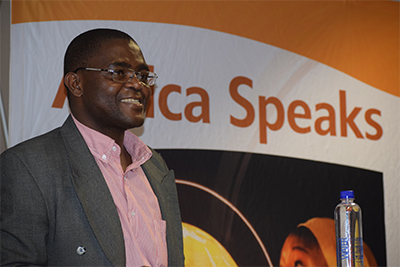“While Afrika speaks today, let me remind you that Africa has spoken before but the voices have only been like echoes in a global wilderness. Since the enslavement and colonial eras, Afrikan voices have spoken and cried but the world has not been humanistic enough to listen.” These were the words spoken by Professor Artwell Nhemachena from the University of Namibia when he delivered the recent Afrika Speaks lecture hosted by the College of Human Sciences.
Professor Nhemachena, who spoke on Decolonisation, Afrikanisation and the Cannibalistic Figure of the Posthuman, said that today, Afrika is speaking yet the world is busy pushing for posthumanist agendas – for agendas beyond humanism – designed to take away the essence of being human. “Because Afrika has spoken before, we perhaps need to think in terms of Afrikan speaking again.”
He lecture outlined that although decolonisation and Afrikanisation are increasingly becoming popular in this era that is replete with tell-tale signs of transformation – albeit variously conceptualised -, hardly any scholarly attention is paid to some underlying tensions in the ways in which the term decolonisation is often deployed. With scholarly emphasis no longer being placed on Afrikan liberation era conceptualisation of decolonisation wherein there was focus on recovering Afrikan materialities that were grabbed by colonialist, the meaning of decolonisation has increasingly shifted over time since the attainment of Afrikan flag independence – minus economic independence.
For some scholars, decolonisation has come to be simplistically interchangeable with ritualistic deconstructing and decentering of hierarchies and borders, assumed to visit domination, exploitation, hegemony, discrimination and difference. Decolonisation has come to imply deconstructing Euro-modern Cartesian binaries or dichotomies that are in theory assumed to be central to the sustenance of difference, domination, hierarchies, anthropocentrism, humanism, exploitation, subject-object ontologies and hegemonic structures.
Concealed is the fact that colonisation was less about setting up modernist binaries and dichotomies than it was about colonialists attaching themselves to Africa as a continent, attaching themselves to Afrikan environments, to Afrikan land and attaching themselves to Afrikans whom they cannibalised, sucked and exploited in the colonial horse and rider relationships. Critically engaging with the scholarly departures from Afrikan liberation era materialistic conceptualisations of decolonisation, this presentation also interrogates the assumptions of flatness that underlie post-Cartesianism, poststructuralism, deconstructionism, postanthropocentrism and posthumanism.
Arguing that colonisation was similarly about flattening Africa as well as about assuming that Afrikans were indistinct or indistinguishable from animals and the rest of nature, he critiqued some versions of decolonisation and decoloniality that essentially replicate colonial assumptions about absence of Afrikan human essence. “Although the colonialists might have considered themselves to be human and to be civilised, they were beastly and animalistic in the colonial frontiers were as savagely as to murder, plunder, rob, loot and suck the blood of their victims whose skulls were shipped to metropolitan centres. At the same colonial frontiers, the colonialist robbed the human essence their victims who were thereby regarded as inconsequential animals, as indistinct from other-than-humans,” he said.
He argued that postanthropocentrism, posthumanism and post-Cartesianism are more about cannibalistic deconstructing and decentering of Afrikan human beings/bodies than they are about decolonisation/decoloniality as understood in the Afrikan historical contexts. He also argued that decolonisation should be about recentering those that were colonially decentered and deconstructed, this presentation contends that there is nothing decolonial about some versions of decolonisation that supremely underwrite and undergird colonial style cannibalistic decentering and deconstruction of what is Afrikan.
“Unfortunately, Afrikan human essence is increasingly embattled in a global neoimperial order in which Afrikan human identity is under attack. Queerness and beastliness are once again being promoted in the guise of freedom and liberty that are reminiscent of colonial era deceptive ideologies of civilisation.”
He continued: “There is nothing decolonial about the manipulation and reengineering of Afrikan identities, human essences and genetics. In fact, the manipulation and reengineering of Afrikan human essences, identities and genetics are part and parcel of the resilient imperial urge to cannibalise the identities, institutions and heritages of the colonised subjects. It is part of the imperial arsenal to cannibalise the pan Afrikanist momentum towards Afrikanisation.
“If Afrikans become hybrids or chimeras, that is, half animal and half human, then how can Afrikans sustain the momentum towards Afrikanisation? If Afrikan genetic compositions are manipulated and reengineered, then how can Afrikans sustain the momentum towards Afrikanisation? If Afrikans become beastly queers, then how can Afrikans sustain the momentum towards Afrikanisation? Without Afrikan human essence, Afrikans vanish into the Fanonian zone of nonbeing, into the colonial and enslavement era nothingness. A form of nothingness that some versions of decolonisation would celebrate. Decolonisation should not be about the denial of Afrikan human essence. In other words, decolonisation should be in sync with Afrikanisation.”
Professor Nhemachena’s topic aligned aptly with the vision of the Afrika Speaks lecture series hosted by the College. One of the most promising projects started in 2008 in the College, this innovative series was established by the College under the leadership of its then Executive Dean, Professor Rosemary Moeketsi to achieve a number of objectives aimed at improving the research capacity of the College and enhancing a critical discourse by its academics with Afrikan intellectuals on the Afrikan continent and in the diaspora.
Currently overseen by Professor Puleng Segalo (Head: Graduate Studies and Research, CHS), the vision of Afrika Speaks is to nurture, develop and sustain a vibrant community of researchers and intellectuals in the College connected to the Afrikan continent and diaspora so that we can continue to be innovative in our quest for truth and our contributions to universal knowledge and the transformative needs of a developmental Afrikan state.
* Compiled by Rivonia Naidu-Hoffmeester (CHS communications and marketing)
Source: https://www.unisa.ac.za/sites/corporate/default/Colleges/Human-Sciences/News-&-events/Articles/World-not-humanistic-enough-to-listen-to-Afrikan-voices

